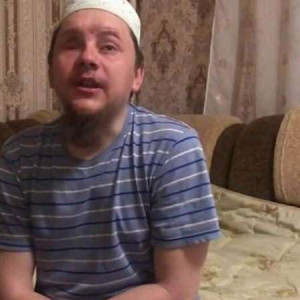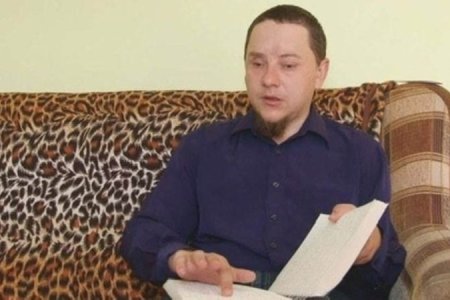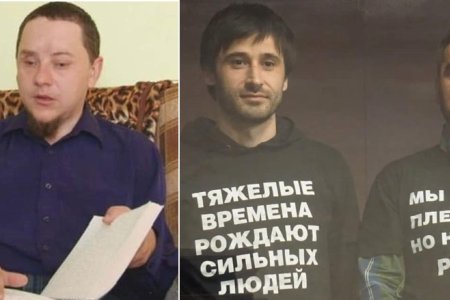
A Siberian court has ordered the release of Oleksandr Sizikov (b. 1984) because the 40-year-old Ukrainian political prisoner’s total blindness should, even according to Russian regulations, preclude his imprisonment. The fact that Sizikov is both blind and disabled did not stop the Russian FSB from arresting him in July 2020, nor two other Russian courts from approving a 17-year sentence in the worst of Russia’s penal institutions. The same courts have also passed equally monstrous sentences against several Crimean Tatar political prisoners with equally grave medical conditions, including 60-year-old Dzhemil Gafarov who died in Russian captivity, and Amet Suleimanov, whose life is in immediate and very real danger.
As reported, the application for Sizikov to be freed came from Russia’s prison service four months after Sizikov was brought to the harsh-regime Minusinsk Prison in Siberia where he was due to serve the first years of a 17-year sentence. According to Olena Sizikova, her son had recently been taken to the Krasnoyarsk tuberculosis hospital No. 1 and given a medical examination. This had confirmed what, in fact, was clear from Sizikov’s medical records, namely that Oleksandr is totally blind, and is also suffering from third stage (or severe) hypertension. In their report, the doctors recommended that Sizikov be released as his main condition, total blindness, is on the list of conditions precluding imprisonment. In April, the Russian prison service filed an application for Sizikov to be released from serving his sentence due to his state of health (Article 81 of Russia’s criminal code and Article 396.6 of the criminal procedure code. This was allowed on 26 May 2025 by the Minusinsk district court. The lawyer, representing Sizikov in court, told Crimean Solidarity that the prison will buy tickets for Sizikov from Krasnoyarsk to Sochi, from where his mother will be able to pick him up.
While this was entirely in accordance with procedure, it is worth noting that all parties to Oleksandr Sizikov’s persecution were fully aware that he was totally blind. This included the FSB who first turned up at Oleksandr’s home on 7 July 2020, arrested him and also planted ‘prohibited religious literature’ which the Ukrainian would not have known was in his home as it was not written in Braille. They would have known, or could swiftly have found out, that Oleksandr had converted to Islam in 2006 at the age of 22, and had, a year later, sustained catastrophic head injuries when his bicycle was hit by a car. He had been blinded and also left unable to walk without assistance. Over the next 11 years he was especially helped by Edem Smailov, the leader of a small religious community and one of eight Crimean Tatars, almost all of them Crimean Solidarity journalists or activists who were seized in Russia’s first major attack on that vital human rights movement. Despite his severe disabilities, Sizikov held two solitary pickets (in April 2019 and May 2020) calling for the release of Smailov and for an end to the repression against Crimean Muslims. Renowned lawyer Emil Kurbedinov, who has himself been the victim of persecution since Russia’s invasion of Crimea, suggested that Sizikov had been targeted in revenge for his outspoken condemnation of the repression unleashed under Russian occupation.
It is difficult to find any other explanation given that the FSB not only targeted Sizikov, as well as two Crimean Tatars - Seiran Khairedinov (b. 1986) and Alim Sufianov (b. 1990), but singled him out for the worst sentence, designating a blind and disabled man as ‘organizer’ of their non-existent ‘terrorist group’.
All three men were charged under Russia’s ‘terrorism’ legislation, with this based solely on entirely unproven accusations of ‘involvement’ in the peaceful transnational Hizb ut-Tahrir Muslim organization which is legal in Ukraine. The Russian supreme court’s outlawing of Hizb ut-Tahrir as ‘terrorist’ in 2003 was never explained, and was kept secret until it was too late to lodge an appeal. Under Russian occupation, it has become a weapon for Russia and its FSB against the Crimean Tatar human rights movement, with most of the political prisoners having been active as Crimean Solidarity civic journalists and activists.
The FSB chose to claim that Oleksandr Sizikov was the ‘organizer’ of a supposed ‘Hizb ut-Tahrir group’ under Article 205.5 § 1 of Russia’s criminal code), with Seiran Khairedinov and Akim Sufianov charged with ‘involvement’ in such an unproven ‘group’ (under Article 205.5 § 2). The choice of alleged roles appears to be arbitrary, but makes a huge difference to the size of the sentence. No attempt was made to make the ‘terrorism’ charges in any way credible, with the prosecutor claiming that Sizikov had organized a group which “carried out covert anti-constitutional activities through exerting influence on people’s religious feelings; organized and carried out meetings of the group, so-called ‘khalakaty’; looked for new participants and circulated the ideas”.
No proof of actual involvement in Hizb ut-Tahrir was provided, but nor was it needed, as the FSB, as always, used illicitly taped conversations sent to FSB-loyal ‘experts’ who oblige by claiming that this or that word or sentiment indicates such involvement. Such fabricated ‘evidence’ is then supplemented by ‘secret witnesses’ who may never have met the defendants and whose testimony cannot be verified. This was one of numerous occasions where the FSB used a supposed ‘anonymous witness’ whose identity has, in fact, long been known, as have his reasons for collaborating with the FSB. Konstantin Tumarevich is a fugitive from justice in his native Latvia, and his vulnerable legal position in occupied Crimea and lack of documents provided the FSB with clear leverage against him. He has thus far been used to provide ‘anonymous witness’ testimony against at least 20 recognized political prisoners.
Although Sizikov was held under house arrest during the ‘trial’, prosecutor Sergei Aidinov tried on several occasions to get him paced in detention, and subsequently demanded an 18-year sentence. On 17 May 2023, ‘judges’ Kirill Krivtsov (presiding), together with Alexei Magomadov and Sergei Yarosh found all three men ‘guilty’ both of the charges under Article 205.5 and of the equally insane charge under Article 278 of ‘planning to violently seize power’.

Sizikov was sentenced to 17 years, Khairedinov and Sufianov to 12 years’, with subsequent periods of 18 months and 12 months, respectively, of restricted liberty. The sentences were for maximum-security penal institutions, with the first four years in the harshest of these, a prison.
All of these sentences against men who had committed no crime were upheld by the Vlasikha military court of appeal on 13 September 2024.
Sizikov was placed in a SIZO, or remand prison, in occupied Crimea, and in December 2024 taken on the gruelling journey from prison to prison, only arriving at the prison in Siberia in February 2025.
Khairedinov and Sufianov, who had also actively supported political prisoners and their families, have both been in Russian captivity since 7 July 2020. Sufianov, who was 30 when arrested, had only recently married. Khairedinov, who is four years older, has three children: Emil; Elvina and Yasmina, who was only a year old when her father was arrested.
Please write to Seiran Khairedinov and Alim Sufianov!
The letters are a lifeline to the men and send an important message to Moscow that its treatment of all Crimean Tatar and other Ukrainian political prisoners is under scrutiny. Letters need to be in Russian, handwritten, and on ‘safe’ subjects. If that is a problem, use the sample letter below (copying it by hand), perhaps adding a picture or photo. Do add a return address so that the men can answer.
Sample letter
Привет,
Желаю Вам крепкого здоровья и надеюсь, Вы скоро вернетесь домой, к своим родным. Простите, что мало пишу – мне трудно писать по-русски, но мы все о Вас помним.
[Hi. I wish you good health and hope that you will soon be home, with your family. I’m sorry that this letter is short – it’s hard for me to write in Russian., but you are not forgotten. ]
Seiran Khairedinov
600020 РФ, Владимирская обл., г. Владимир, ул. Большая Нижегородская, д. 67,
ФКУ Тюрьма №2 УФСИН России по Владимирской области
Хайрединову, Сейрану Нуриевичу г.р. 1986
[or in English: 600020 Russian Federation, Vladimir, 67 Bolshaya Nizhegorodskaya St., Prison No. 2
Khairedinov, Seiran Nurievych, b. 1986
[Seiran’s birthday is on 3 October]
Alim Sufianov
600020 РФ, Владимирская обл., г. Владимир, ул. Большая Нижегородская, д. 67,
ФКУ Тюрьма №2 УФСИН России по Владимирской области
Суфьянову,Алиму Нуритдиновичу? г.р. 1986
[or in English: 600020 Russian Federation, Vladimir, 67 Bolshaya Nizhegorodskaya St., Prison No. 2
Sufianov, Alim Nuritdinovych, b. 1990
[Alim’s birthday is on 16 May]



